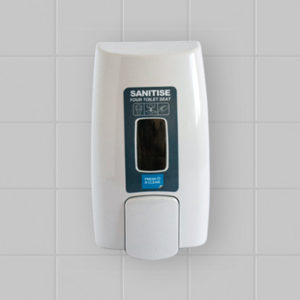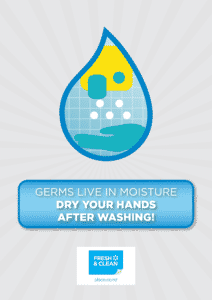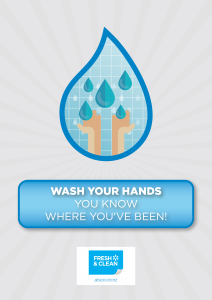Hand washing is a necessity that makes life bearable. It is the main foundation of hygiene maintenance.
Fact: Washing hands is a symbolic act which signifies purity in communities.
As the old saying goes, ”Cleanliness is next to godliness.”
But did you know that only 5% of people know how to wash their hands properly? So, to increase this percentage, there are initiatives that provide hand care education.
For example, in New Zealand, health boards develop plans to improve hand hygiene.
There is an immediate need for proper hand hygiene education in workplaces.
The best way to live a healthier lifestyle is for workers to put in a personal effort to do better. If you are reading this, you are definitely in the right place.
These hand washing tips will help you improve your workers’ hand hygiene habits.
Use the Correct Products
It’s crucial to equip workplace washrooms with high-quality hand hygiene products.
Install automatic soap dispensers to make hand wash more accessible to workers.
Interestingly enough, studies show that the presence of soap dispensers encourages hand washing.
Dispensers are a popular choice, compared to a bar of ordinary soap, for the following reasons:
- Dispensers don’t preserve dirt from previous users unlike bars of soap.
- They are resourceful because they release exact amounts of soap to prevent waste.
- Dispensers use sensors to detect hands and release the soap. There is minimal physical contact with the machine, thus reducing the spread of illnesses.
- They contain antibacterial soaps that lather well for people with sensitive skin.
To use soap well, workers must know how to wash their hands correctly. By doing so, their health stays in check.
Encourage them to follow these steps:
- Wet your hands with either warm or cold water. Turn off the faucet to conserve water.
- Lather well after placing a dollop of soap onto your palms.
- Massage your hands between your fingers and under your nails to weaken dirt particles.
- Rinse your hands well to make sure there are no traces of soap left.
This fascinating video demonstrates proper handwashing techniques for practice. Show this video to your colleagues to ensure they maintain the habit of cleanliness.
Wash Hands for the Appropriate Amount of Time
Our hands touch many items in a typical workday, causing germs to accumulate.
So, washing hands for the appropriate amount of time kills germs and reduces the spread of illnesses.
In turn, workers are more productive, which translates to fewer sick days taken. As a result, your workers are more energetic and your business profits improve.
Did you know that people wash their hands for an average of six seconds?
Improve this and advise workers to wash their hands for 20 to 30 seconds for better sanitary results. The World Health Organisation insists this is a suitable amount of time to do a thorough job.
How can workers measure the time while washing their hands?
They don’t need to count down, as this can be boring and overwhelming.
Instead, have some fun with the process and suggest they hum the ‘’Happy Birthday’’ song twice. This way, remembering the correct hand washing duration becomes easier.
As a result, handwashing becomes an enjoyable activity for everyone in the workplace.
“Hygiene is two-thirds of health.” — Proverb.
Dry Your Hands Well

Super-fast, quiet, and environmentally-friendly Jet Dry Executive
Ensure workers dry their hands well by supplying either paper towels or hand dryers.
Both of these products get the job done, but many workers prefer hand dryers.
This research concludes that dryers are more beneficial because they reduce the transfer of bacteria.
These are the pros of hand dryers:
- They are eco-friendly as some paper towels are non-recyclable.
- Hand dryers need less effort because they do the task for you.
- They are a cost-effective option, as they don’t need constant maintenance.
Why is it important for your colleagues to dry their hands?
Specialists confirm that wet hands attract germs easier. Instruct your workers not to shake their hands dry because this retains moisture.
Also, place mini hand lotion near washroom sink areas. This prompts workers to moisturise their hands, thus protecting them from dryness and lifting cuticles.
Don’t Overdo It
Having the appropriate knowledge is excellent, but you need to know how to use it well.
Hand washing is an inexpensive way to keep workers healthy, but are they aware that excessive hand washing may make them sick?
Let them know that although frequent hand washing is helpful, overdoing it may be harmful to their wellness.
Our bodies use a special type of bacteria to boost immunity levels. Without it, we fall sick more often.
Thus, they don’t need to wash their hands every instant. Instead, shift their focus on keeping a proper balance.
According to New Zealand experts, we should wash our hands during key moments.
Inform your workers to wash their hands before:
- Preparing meals or eating.
- Caring for sick people.
- Touching or rubbing their eyes.
And wash their hands after:
- Using the washroom.
- Gardening.
- Coming into contact with animals.
- Touching rubbish bins.
- Changing nappies.
- Sneezing, coughing or itching.

Powerful, alcohol-based Hand Sanitisers
Employees should also wash their hands when they are visibly dirty.
When in a rush and in need of a quick solution, encourage the use of hand sanitiser or antibacterial wipes. These products work well when soap and water are unavailable, such as during fieldwork.
Today, many workplaces encourage the use of alcohol-based sanitisers because of their excellent performance.
These products have lower operational costs and require few refills, which are efficient in providing a great hand hygiene experience.
By observing these steps, workers learn to sanitise their hands well:
- Spritz a good amount onto one palm.
- Rub your hands together until the hands are dry.
Yet, where there is an option, using soap and water is better.
Pay Attention to Hand Hygiene Posters
Handwashing posters are crucial in guiding hygiene habits. They come in different creative designs and slogans to grasp people’s attention.
Using visual reminders is interactive in communicating your business’ values. It shows workers that their hygiene is a priority.
As such, teach workers to mind their surroundings and pay attention to any posters within sight.
Have a look at the reasons why posters are powerful in the workplace:
- They remind workers of the proper hand care techniques that contribute to their wellbeing.
- They provide workers with useful hand hygiene facts that encourage them to wash their hands.
Ensure you choose posters that are visible and appealing to the eye. Place them near product dispensers to encourage hand care.
Adopting great hand hygiene habits in the workplace leads to the health protection of the community in general.
Do you need exceptional hand hygiene products in your workplace? Alsco is full of local experts who will make the job a walk in the park. Fully-managed hand hygiene products are only one call away.
Upgrading your hand hygiene regime will happen in no time!
“…a competitive pricing structure and robust product range.” — Richard Brain, Operations Manager, Jani-King.




